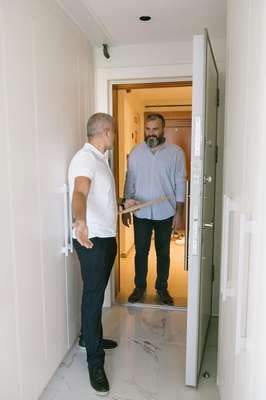Are you dropping by someone's home? Here are some tips for a fun, friendly visit!
By
Danielle F.
- Replies 7
In an age where digital communication reigns supreme, the art of personal visits has become more complex.
Gone are the days when neighbours would pop over for a cup of tea unannounced, or are they?
Whether it's still acceptable to visit someone without prior notice stirs up various opinions and emotions.
Etiquette expert Anna Musson suggested that the thought of unexpected visitors can be alarming for many.
Yet, as an advocate for casual drop-ins, Musson emphasised their importance—especially among close friends or family who live nearby and understand that visits are welcome.
When considering a spontaneous visit, it's crucial to 'pick your audience'.
Musson advised reflecting on your relationship with the person you plan to visit.
If it's someone you're unfamiliar with or someone who takes great pride in their home, it's courteous to give at least a five-minute heads-up—even if that means sending a quick text from their driveway.
This respects their right to present their home as they wish and prepares them for your arrival.
There's also a generational aspect to consider.
Older generations who grew up with frequent drop-in visits may be more comfortable.
In contrast, younger individuals, like 24-year-old Dharani McDonald, expressed mixed feelings.
'I'd love someone to drop around and say, "Hey, what's going on?" At the same time, what if I want to relax for the evening, and someone comes in and disrupts those plans? McDonald shared.
The pandemic also complicated matters, making the concept of unexpected visits less common than before.
Reading the room is another critical piece of advice from Musson.
It's essential to allow your hosts to decline your visit.
If you sense it's not a good time, offering to return another time is acceptable.
Etiquette is about empathy and considering the other person's situation.
Advance notice has become more important for parents like Emily Henwood since having a child.
The unpredictability of parenting means that drop-ins can clash with family time and other activities.
Henwood suggested that an hour's notice is ideal, allowing for some flexibility while managing her toddler's needs.
One golden rule Musson emphasised was to never arrive empty-handed.
Bringing a small gift or offering is a gesture of goodwill, showing you're considerate of the effort involved in hosting, even just for a brief encounter.
In some country towns, the culture of open invitations still thrives.
Anthony Bolden, 53, always visits friends with drinks in tow.
'Just on a Sunday afternoon or Saturday afternoon, I'll pull up at a mate's place, and you'll know they're home and doing nothing, and you'll have a couple of cans,' he shared.
'If someone's home with their car in their driveway, that's the invitation to pull up.'
But what if you're the recipient of a drop-in and you're not in the mood for company?
Musson suggested using the sandwich technique: cushion the refusal between two positive statements.
If all else fails, there's no harm in turning off the lights and enjoying some quiet time at home.
Social norms are ever-evolving—while the convenience of digital communication has its perks, a warm, face-to-face chat can't be replicated by technology.
However, respecting boundaries and maintaining good etiquette ensures that these interactions remain a pleasure rather than a source of stress.

What are your thoughts on the etiquette of dropping in? Do you welcome a friend's surprise at your door, or do you prefer a heads-up? Share your experiences and preferences in the comments below!
Gone are the days when neighbours would pop over for a cup of tea unannounced, or are they?
Whether it's still acceptable to visit someone without prior notice stirs up various opinions and emotions.
Etiquette expert Anna Musson suggested that the thought of unexpected visitors can be alarming for many.
Yet, as an advocate for casual drop-ins, Musson emphasised their importance—especially among close friends or family who live nearby and understand that visits are welcome.
When considering a spontaneous visit, it's crucial to 'pick your audience'.
Musson advised reflecting on your relationship with the person you plan to visit.
If it's someone you're unfamiliar with or someone who takes great pride in their home, it's courteous to give at least a five-minute heads-up—even if that means sending a quick text from their driveway.
This respects their right to present their home as they wish and prepares them for your arrival.
There's also a generational aspect to consider.
Older generations who grew up with frequent drop-in visits may be more comfortable.
In contrast, younger individuals, like 24-year-old Dharani McDonald, expressed mixed feelings.
'I'd love someone to drop around and say, "Hey, what's going on?" At the same time, what if I want to relax for the evening, and someone comes in and disrupts those plans? McDonald shared.
The pandemic also complicated matters, making the concept of unexpected visits less common than before.
Reading the room is another critical piece of advice from Musson.
It's essential to allow your hosts to decline your visit.
If you sense it's not a good time, offering to return another time is acceptable.
Etiquette is about empathy and considering the other person's situation.
Advance notice has become more important for parents like Emily Henwood since having a child.
The unpredictability of parenting means that drop-ins can clash with family time and other activities.
Henwood suggested that an hour's notice is ideal, allowing for some flexibility while managing her toddler's needs.
One golden rule Musson emphasised was to never arrive empty-handed.
Bringing a small gift or offering is a gesture of goodwill, showing you're considerate of the effort involved in hosting, even just for a brief encounter.
In some country towns, the culture of open invitations still thrives.
Anthony Bolden, 53, always visits friends with drinks in tow.
'Just on a Sunday afternoon or Saturday afternoon, I'll pull up at a mate's place, and you'll know they're home and doing nothing, and you'll have a couple of cans,' he shared.
'If someone's home with their car in their driveway, that's the invitation to pull up.'
But what if you're the recipient of a drop-in and you're not in the mood for company?
Musson suggested using the sandwich technique: cushion the refusal between two positive statements.
If all else fails, there's no harm in turning off the lights and enjoying some quiet time at home.
Social norms are ever-evolving—while the convenience of digital communication has its perks, a warm, face-to-face chat can't be replicated by technology.
However, respecting boundaries and maintaining good etiquette ensures that these interactions remain a pleasure rather than a source of stress.
Key Takeaways
- Etiquette expert Anna Musson advised that dropping by unannounced should depend on your relationship with the person and their preferences.
- Older people are typically more comfortable with unexpected drop-ins than younger generations, who may see it as disruptive to scheduled activities.
- Ms Musson also suggested allowing hosts to turn down unannounced visitors and never arrive empty-handed.
- A more open-door policy prevails in some rural towns, signifying tight-knit communities.
- In case a host declines, Ms Musson recommended using the sandwich technique to set boundaries for drop-in visits.








